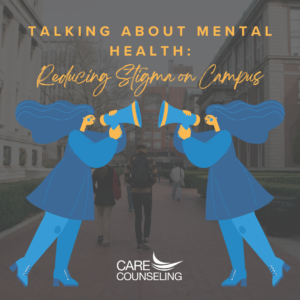Reducing Stigma on Campus
 Mental health is an integral aspect of overall well-being, yet it’s often shrouded in stigma and silence. College campuses, meant to be centers of growth and learning, are no exception. However, the tide is turning as more individuals and institutions recognize the importance of addressing mental health openly and compassionately.
Mental health is an integral aspect of overall well-being, yet it’s often shrouded in stigma and silence. College campuses, meant to be centers of growth and learning, are no exception. However, the tide is turning as more individuals and institutions recognize the importance of addressing mental health openly and compassionately.
Breaking the Silence
The stigma surrounding mental health has long prevented individuals from seeking help when they need it most. Many fear judgment, discrimination, or alienation if they open up about their struggles. As a result, the burden of mental health issues often remains hidden, leading to worsening conditions and feelings of isolation. College campuses have the unique opportunity to be catalysts for change, creating an environment where conversations about mental health are welcomed and encouraged.
The Importance of Open Conversations
Talking openly about mental health benefits everyone. It helps to break down the walls of isolation that many individuals with mental health challenges experience. It also educates others about the complexities of mental health, fostering empathy and understanding. When we normalize conversations about mental health, we create a supportive atmosphere where individuals feel comfortable seeking help without fear of judgment.
Destigmatizing Mental Health
Reducing the stigma surrounding mental health on campus requires a multifaceted approach:
- Education:
One of the most effective ways to combat stigma is through education. Offer workshops, seminars, and events that educate students and staff about mental health, its prevalence, and its various forms. When people understand that mental health challenges are common and not a sign of weakness, stigma begins to diminish.
- Empower Student Voices:
Give students a platform to share their mental health stories and experiences. Personal stories have the power to humanize mental health struggles and show that seeking help is a sign of strength. Guest speakers, storytelling events, and writing workshops can all contribute to amplifying these voices.
- Normalize Language:
Use inclusive and compassionate language when discussing mental health. Avoid stigmatizing phrases and encourage others to do the same. Language has a powerful impact on shaping perceptions and attitudes.
- Provide Resources:
Make information about mental health resources readily available and easily accessible. This includes information about counseling services, support groups, crisis helplines, and self-care strategies. When individuals know where to turn for help, they’re more likely to seek assistance.
- Engage Faculty and Staff:
Create an environment where faculty and staff are trained to recognize signs of distress and equipped to provide support. Their understanding and empathy can make a significant difference in students’ lives.
- Collaborate with Mental Health Professionals:
Partner with mental health professionals to offer regular office hours or drop-in sessions on campus. This provides students with an opportunity to ask questions, seek advice, or simply have a conversation about their mental well-being.
- Awareness Campaigns:
Launch awareness campaigns that highlight the importance of mental health and challenge stereotypes. These campaigns can include posters, social media posts, and events that encourage dialogue.
- Peer Support Programs:
Establish peer support programs where trained students provide support and a listening ear to their peers. Peer-to-peer interactions can be incredibly effective in fostering trust and understanding.
- Encourage Self-Care:
Promote self-care strategies that contribute to mental well-being. Encouraging activities like mindfulness, exercise, and creative expression can help students manage stress and improve their mental health.
- Leadership from the Top:
Campus administrators and faculty can set the tone by openly discussing mental health and sharing their support for de-stigmatization efforts. When leaders lead by example, it sends a powerful message to the entire campus community.
Reducing the stigma surrounding mental health on college campuses is a collective effort that requires compassion, empathy, and open-mindedness. By fostering an environment where conversations about mental health are welcomed and supported, colleges can create a space where individuals feel comfortable seeking help and supporting one another. Through education, awareness campaigns, peer support, and leadership from the top, campuses can contribute to a societal shift that views mental health with empathy and understanding. Remember, every conversation about mental health helps to create a brighter, more inclusive future for everyone.



























